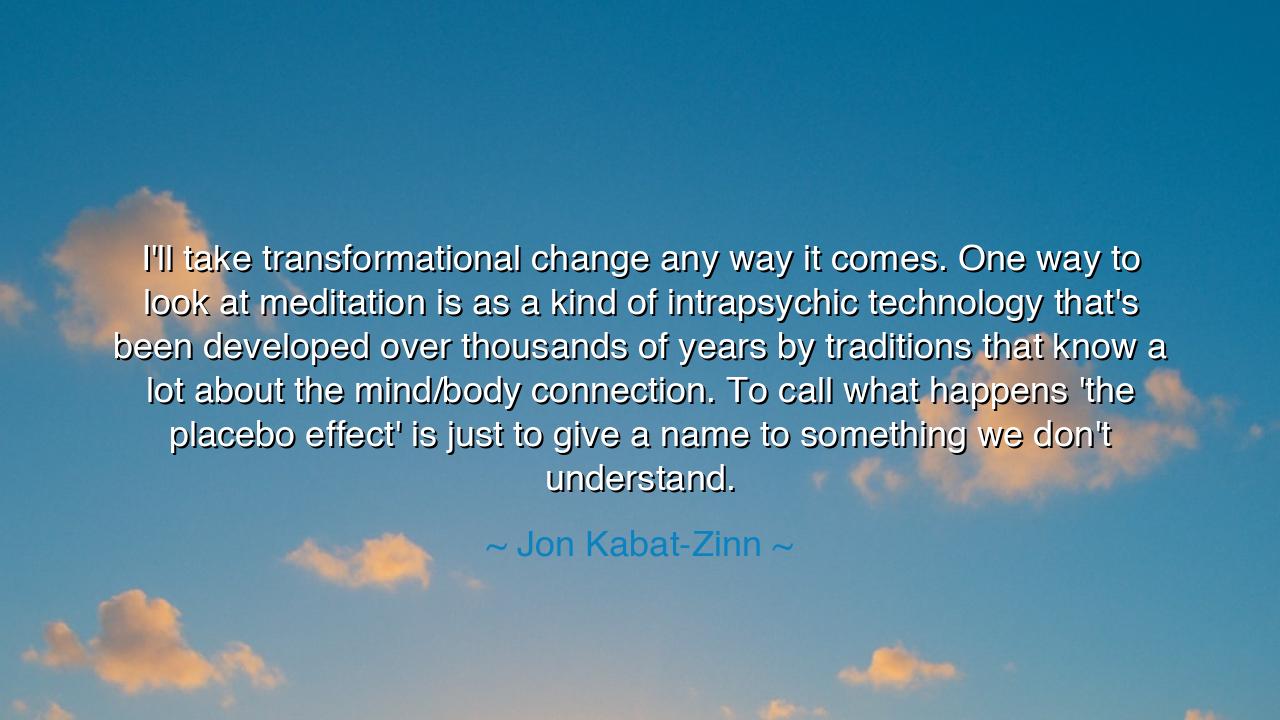
I'll take transformational change any way it comes. One way to
I'll take transformational change any way it comes. One way to look at meditation is as a kind of intrapsychic technology that's been developed over thousands of years by traditions that know a lot about the mind/body connection. To call what happens 'the placebo effect' is just to give a name to something we don't understand.






Hearken, O children of the inward path, to the words of Jon Kabat-Zinn, pioneer of mindfulness in the West, who declared: “I'll take transformational change any way it comes. One way to look at meditation is as a kind of intrapsychic technology that's been developed over thousands of years by traditions that know a lot about the mind/body connection. To call what happens 'the placebo effect' is just to give a name to something we don't understand.” In this utterance lies a truth both ancient and modern: that the soul possesses tools as profound as any machine, and that the unseen workings of the heart and mind may heal and transform as surely as the scalpel or the drug.
For Kabat-Zinn speaks of meditation, a practice refined by sages across millennia, from the hermits of the Himalayas to the monks of China, from the mystics of desert caves to the seekers of forests. He calls it an intrapsychic technology, reminding us that it is not mere ritual or superstition, but a method honed like a tool, shaped through generations of observation and practice. Just as the craftsman forges iron into sword or plow, so too have spiritual traditions forged meditation into a discipline that reveals the deep unity of mind and body.
And yet, the modern age, clothed in the pride of science, often dismisses what it cannot measure. Some have said that the effects of meditation are nothing but the placebo effect, as though the healing of stress, the calming of fear, the renewal of spirit were illusions. But Kabat-Zinn rebukes this: to call it “placebo” is simply to name what remains mysterious. For what is placebo, if not the untapped power of the mind to shape the body, the spirit to shape the flesh? Even in this naming, the mystery still shines, asking us to bow in humility before what we do not yet understand.
Consider, O listener, the tale of Marcus Aurelius, emperor of Rome, who in the chaos of battle and governance turned inward to still his soul. In his Meditations, he wrote not of conquest, but of calm, of breathing through storms, of finding harmony with the universe. Without temples of neuroscience or machines of measurement, he discovered within himself what Kabat-Zinn affirms: that transformation comes through the discipline of attention, through the quiet mastery of one’s own thoughts. Such inner work has always been the technology of survival.
The words of Kabat-Zinn also remind us that transformational change wears many forms. It may come through medicine, through technology, through ritual, through silence. We should not scorn any doorway simply because it is unfamiliar. Whether the healing is born of pills or prayers, of machines or meditation, what matters is that the transformation occurs—that the weary are renewed, the broken restored, the fearful given courage. Wisdom lies not in judging the path, but in walking it with openness and humility.
And yet, his teaching is not a call to abandon reason, but to broaden it. To honor both the power of modern science and the ancient technologies of the mind. For humanity’s future will not be secured by rejecting one in favor of the other, but by uniting them—by weaving the precision of science with the depth of contemplative traditions, creating a medicine that heals both body and soul.
Therefore, O seeker, take this lesson into your days: do not dismiss the mysteries of your own mind. Practice patience, breathing, and awareness as faithfully as you take your medicine or earn your bread. Allow space for silence, for reflection, for the deep listening that heals unseen wounds. And remember Kabat-Zinn’s wisdom: call it placebo, call it meditation, call it transformation—names matter less than the truth they point to. What matters is that you open yourself to change, for in change lies the renewal of life.






AAdministratorAdministrator
Welcome, honored guests. Please leave a comment, we will respond soon